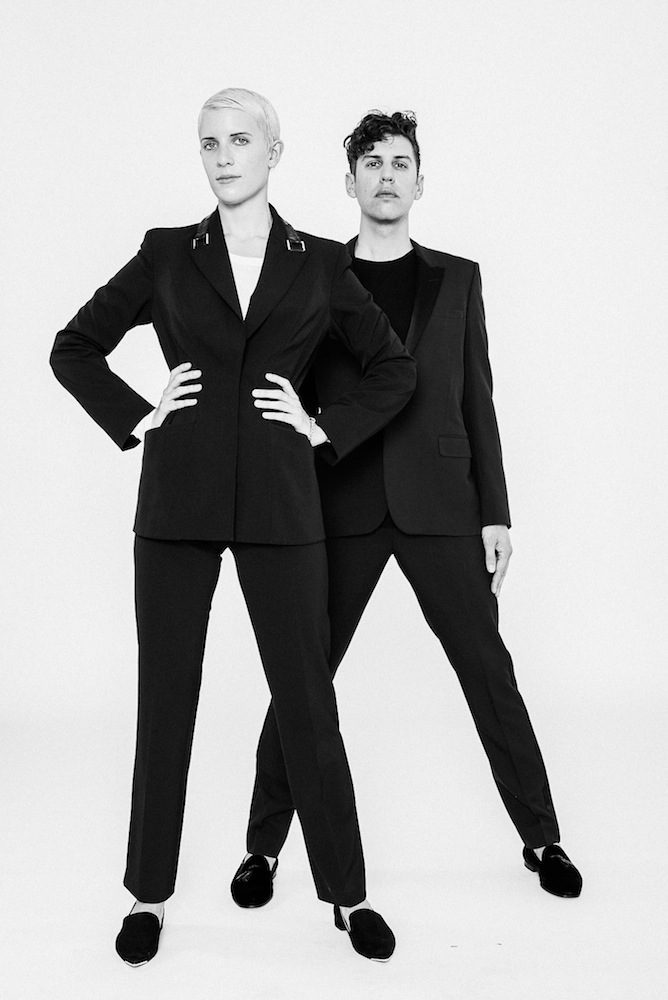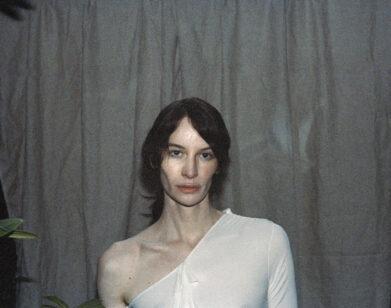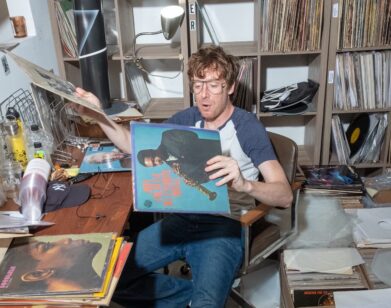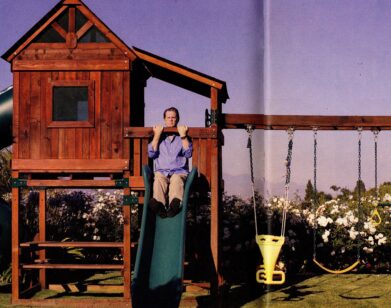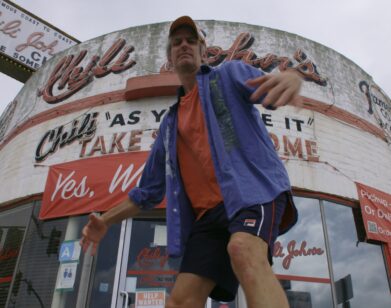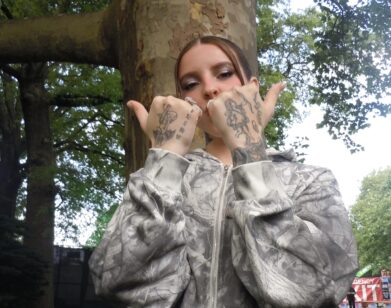Yacht’s Future is Now
YACHT (CLAIRE L. EVANS AND JONA BECHTOLT) IN LOS ANGELES, OCTOBER 2015. PHOTOS: CARA ROBBINS. STYLING: LISA MADONNA. HAIR: GUI SCHOEDLER FOR EXCLUSIVE ARTISTS MANAGEMENT USING ORIBE HAIR CARE. MAKEUP: ERIN MOFFETT/JED ROOT.
Following 2011’s Shangri-La, Los Angeles-based electro-pop duo YACHT (Young Americans Challenging High Technology) has returned to the spotlight with a much-anticipated sixth studio album I Thought the Future Would be Cooler (out now via Downtown Records). True to form, it’s a release full of metallic dance beats and tech hooks focused on decoding the ways of our modern world.
Composed of Claire L. Evans and Jona Bechtolt, YACHT is as much a self-proclaimed belief system as it is a pop duo. Accordingly, the pair addresses economic disparities, clean water initiatives, trigger-friendly cops, and more—dutifully giving listeners a peek behind the curtain in hopes of instigating meaningful conversations.
Tomorrow, Evans and Bechtolt take the stage for a soldout show at Brooklyn’s Rough Trade. Before the performance, we spoke about the four years since their last release, moving to L.A., and why they can’t help but laugh at the world.
BENJAMIN LINDSAY: It’s been a few years since the last time you spoke with Interview. What’ve you been up to?
JONA BECHTOLT: Since our last full-length record, we’ve released three or four singles, all of which have had an identity of their own—complete with videos and weird extracurricular objects. Claire started an editing job at Motherboard, Vice’s science and technology platform.
CLAIRE L. EVANS: I launched a sci-fi magazine [Terraform]. We made an app.
BECHTOLT: We made a pilot for a TV comedy series [Support] and sold it to Amazon. It was in development for 18 months before petering out.
EVANS: We moved to Los Angeles…I guess we worked on this record!
LINDSAY: Given the album’s title, what do you have in mind when considering the “the future”? And what disappoints you about today?
BECHTOLT: Human rights, riot cops, social media, clean water, water in California…
EVANS: Distributed wealth…
BECHTOLT: Air quality…stuff like that.
EVANS: One of our big concerns with this album—and we probably should’ve thought of this before naming it I Thought the Future Would Be Cooler—was that people would think we’re coming from a place of entitlement.
BECHTOLT: That’s another way we thought the future would be cooler—we didn’t think that people would feel so entitled all the time.
EVANS: We don’t want people to think that we’re tromping around, pointing negatively at the world saying, “I wanted a jetpack! I wanted a hover board! Where’s all the stuff I wanted?” It’s not about that at all.
BECHTOLT: It’s mostly meant to be funny.
EVANS: We tend to take a strong position in order to create a proposition that other people can then bounce off of. One of our goals as a band is to start conversations, and to have actual conversations about things that are relevant to the world. So saying, “I thought the future would be cooler,” I think invites people to contribute what they thought the future would be—what they see as being the feeling of the present. It’s there to incite conversation.
LINDSAY: When looking at a song like “L.A. Plays Itself,” you sing, “You think it’s like this but it’s really like that / Can you read the writing on the wall?” Are you consciously taking on the role of Toto and pulling back the curtain?
EVANS: I love that. One of our great interests as creative people is to see behind curtains in general. We tend to take on projects largely because we want to see how things are made, how things are done. We’ll sometimes do things that are very much outside of our wheelhouse just so we can know how it’s done.
BECHTOLT: When we were making the album, one of the things we wanted to get across musically was that every song would have some kind of curtain that would either drop or be pulled back slightly.
EVANS: Songs on the record tend to start one way and then reveal themselves as something else halfway through—or become deconstructed and turn into a different kind of identity. It’s really fun for us to jump from sound to sound and place to place and idea to idea.
LINDSAY: These ideas are tackled in a playful way. What role does humor play in your songwriting?
EVANS: I think it’s impossible to make art and music—at least for us—that is completely serious. The world isn’t like that, and people’s attitude about art isn’t like that. Nothing is ever cut and dry. You can never impose your very specific and very serious point of view and have everyone on board if you’re serious 100 percent of the time. It’s very difficult to enforce a monolithic kind of thing without a wink or a little bit of humor to make it more approachable.
BECHTOLT: We’re just fans of comedy and fans of humor. We have been—it’s informed everything we’ve done we’ve done from the beginning.
EVANS: And this record is about the present. It’s got “future” in the title, but like any piece of science fiction, it’s much more about the present than it is about the future. The present is very terrible and very scary in a lot of ways, but it’s also so funny. We live in this crazy world—it’s dystopian, but it’s also hilarious. You have to have a solid awareness of the humor of the world in order to sort of survive.
LINDSAY: Considering the acronym YACHT, do you think that today’s technology brings us nearer to the present “moment,” or is it ultimately distancing?
EVANS: We’re not reactionary about that stuff. I hate that. Like, “Oh, everyone’s locked on their phones!” Sure, I think we all feel that way sometimes, but at the same time, it’s not pragmatic. It’s not useful. We’re not all going to suddenly unplug and be a better society. Everything comes with its positives and negatives.
BECHTOLT: And society was fucked up before there were smartphones.
EVANS: For us, we want to talk about the present, but we don’t want to do it from some kind of separated island on the other side. We’re not looking at it from a distance. We’re in the world like anybody else.
LINDSAY: Did your recent move to Los Angeles at all play a role thematically in I Thought the Future Would Be Cooler?
EVANS: We’re happy here and productive and creative, and I think this city doesn’t force you into any corner. You can do your own thing and there’s a lot of people doing different things all on top of each other at various levels of visibility. It’s somewhat empowering to not be pigeonholed at all. You can exist on a lot of different planes here.
LINDSAY: I love that your mission statement is that YACHT is as much a belief system as it is a musical outfit. What traits does the ideal candidate of this belief system have?
EVANS: [laughs] I mean, we don’t want to be dogmatic. Every rock ‘n’ roll band has a set of beliefs. Not everyone wants to wear them on their sleeves or outline it the way we have, but we’ve always believed in transparency. It’s so interesting to learn where an artist is coming from, at least for us and artists we like. We love to know about where they stand on certain issues, what they feel, and where they position themselves in the world intellectually. So we want to provide that for our fans. I think that the ideal “candidate” of the YACHT belief system is somebody who is open-minded, self-reliant, not entitled, curious, and generous.
YACHT WILL PLAY TOMORROW, NOVEMER 5 AT ROUGH TRADE. FOR MORE INFORMATION, VISIT YACHT’S WEBSITE.

